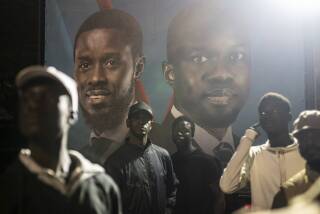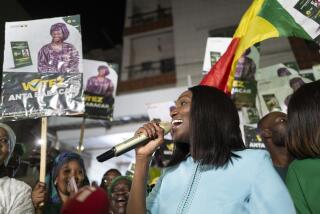‘An African Election’ review: Crucial vote for Ghana, democracy
Americans can barely be bothered to vote in our own elections, so why should we care enough about anyone else’s to watch the gripping examination of Ghana’s 2008 presidential contest on display in “An African Election”?
That reservation was frankly shared by director Jarreth Merz, who went to Ghana to make a much more personal film and ended up documenting this landmark election because it turned out to be too compelling to turn away from, a judgment viewers are likely to agree with.
Though he was born in Switzerland, Merz has deep Ghanaian roots on his grandmother’s side and spent seven years of his boyhood living in the country. That makes him a perfect combination of insider and outsider, comfortable and well-connected there while retaining the perspective of someone who has made his life elsewhere.
Merz was also in a position to understand why this election was so crucial not only to Ghana but also to the future of representative democracy in Africa and the rest of the former colonial world.
Ghana was the first country in sub-Saharan Africa (in 1957 under Kwame Nkrumah’s leadership) to gain its independence. It was also a country where that promise of freedom dissipated as Nkrumah went to one-party rule and ended up overthrown in a coup.
The 2008 presidential contest turned out to be the fifth since multi-party democracy was reintroduced in 1992 after a series of military regimes, an election between the two parties that had taken turns holding that office.
On one side was the New Patriotic Party, the NPP, the organization then in power but represented by a new candidate, Nana Akufo-Addo. Opposing him was professor John Atta Mills of the National Democratic Congress, the NDC, the party of former ruler Jerry Rawlings, still very popular in the country.
Adding extra importance to the Ghana election was the fact that it took place at a crucial time for Africa, after political turmoil characterized by violence and sectarian strife erupted in Kenya, Zimbabwe, Mauritania and Guinea, among other countries.
No one in Ghana questioned that the best way forward for the country economically was to have a stable, honestly elected government. Still, it was unclear whether Western-style democracy had a future on the African continent.
Making “An African Election” special is the access Merz and cameramen Topher Osborn and Kevin Merz (the director’s brother) had to Ghanaian events. The film team had a gift for being where the electoral action was, and for seeing what was transpiring with an astute eye.
These gifts proved especially critical during the tense and combative electoral endgame, which featured harsh confrontations over who won and who lost and whether the inevitable disputes could be settled without violence breaking out in the streets.
Filmmaker Merz proves to be a fine interviewer, talking not only to politicians but also to journalists, commentators and average citizens. What is finally most compelling about this film is the sense it gives of how passionately the citizens of Ghana believe in democracy, how much it means to them.
In the uncertain aftermath of the “Arab spring,” there is no more heartening message.
More to Read
The biggest entertainment stories
Get our big stories about Hollywood, film, television, music, arts, culture and more right in your inbox as soon as they publish.
You may occasionally receive promotional content from the Los Angeles Times.







